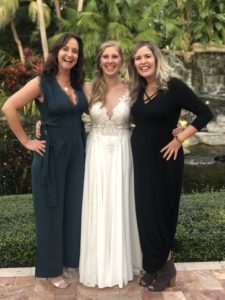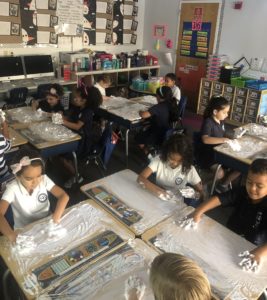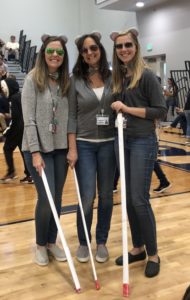
Left to right: Laura Fitzpatrick, Lynsie Edmiston, Jessica Boston
Fitzpatrick, Jessica Boston and Lynsie Edmiston teach first grade at North Broward Preparatory School in Coconut Creek, Florida. Each has a class of 15 students.
Fitzpatrick and Boston in June 2018 enrolled in Orton-Gillingham training with the Institute for Multi-Sensory Education, while Edmiston completed a program at Columbia University.
“Most of us tutor over the summer,” said Boston, who is in her 10th year of teaching. “It was a long-term investment in ourselves. We were finding that there was a high demand for tutors and thought the kids could really benefit from Orton-Gillingham.”
The teaching strategy breaks down reading and spelling into smaller skills involving letters and sounds, and then builds on those skills over time. Educators use sight, hearing, touch and movement to help students connect with concepts in fun and meaningful ways.
All three teachers were so enthused by their summer training that they returned to Florida ready to shake things up.
“We mapped out which stories we were going to be doing in each trimester,” Fitzpatrick said. “We mapped out which spelling skills we were going to be implementing. … And then we also did math that way and every part of our curriculum that way. We made a brand new scope and sequence for ourselves, and it was OG that inspired us to do it.”
 Boston said her students took to Orton-Gillingham instruction immediately. The kids love sand, jumping jacks and full body movements — and get a kick out of practicing red words in goofy voices, like a monster on Halloween.
Boston said her students took to Orton-Gillingham instruction immediately. The kids love sand, jumping jacks and full body movements — and get a kick out of practicing red words in goofy voices, like a monster on Halloween.
“The kids have taken an ownership of it: What’s our spelling skill of the week? What are our red words?” Boston said.
Another favorite for the Florida first graders is shaving cream.
“We try to do it at the end of the day because it’s actually great for taking marker and glue off the desk,” Fitzpatrick said with a laugh. “It’s a good clean-up factor.”
North Broward Preparatory School sits in coastal Broward County in southeastern Florida. The private school, which offers pre-K through 12th grade instruction, is roughly 12 miles north of Ft. Lauderdale. The student body is capped at 1,650 with options for day or boarding school.
North Broward is part of the Nord Anglia Education network, which includes 56 international schools in 26 countries.
Boston and Fitzpatrick said teaching at the private school has allowed them curriculum flexibility they didn’t experience at public schools. The teachers plan lessons together so that all first graders have consistent foundations moving into second grade.

Left to right: Jessica Boston, Laura Fitzpatrick, Lynsie Edmiston
“Our school is very forward-thinking,” Fitzpatrick said, “so anything that we really want to try or implement or do, they’re very into. It’s a great place to teach and try new things. … We knew our principal would be on board with us implementing OG.”
When Fitzpatrick was in college, she learned the “whole language” approach to literacy instruction.
“Phonics was bad a word,” said Fitzpatrick, who has taught for nearly 20 years and was a stay-at-home mom for 10. “It just depends on when you go [to college]. … I wasn’t really taught how to teach phonics in a way that I could really apply.”
She thought some students had similar holes in phonics comprehension and that signing up for Orton-Gillingham training through the Institute for Multi-Sensory Education could be the answer. She and Boston are glad they did.
“I think it’s the most amazing way to learn how to read,” Boston said. “It just makes sense, especially with the multi-sensory component. The whole time we sat there, I just kept thinking: How did I learn how to read? You know, you learn all these rules and all these tricks and spelling, open and closed syllables. You just take for granted your ability to spell and read and write.”
Students’ reading and decoding skills are growing, the teachers said, but one of the biggest indicators of success has been spelling.
“A lot of times we would have spelling words, and a week later, the student would say, ‘Well, how do you spell the word?’” Boston said. “And I was like, ‘Well, it was on your spelling test last week.’ But the student would have no memory of it. It was just: memorize for the test, and then it’s gone.”
Now, students are applying skills they learn each week.
“I say, ‘Well, that was a green word. Go use your hand and tap it out,’” Boston said. “It just equips them with a tool set of things to make them successful — whether it’s writing the words or reading them in a book.”
“We’re only in our first year, but so far, we’ve seen great progress,” Boston said.
IMSE believes that all children should be able to read. To achieve this end, IMSE wants to bring Orton-Gillingham to all educators to give children the best literacy instruction possible.
Learn more about what you can do to improve literacy for all using the Institute for Multi-Sensory Education’s Orton-Gillingham training.
Please connect with us on Facebook, Twitter, and Pinterest to get tips and tricks from your peers and us. Read the IMSE Journal to hear success stories from other schools and districts, and be sure to read the OG Weekly email series for refreshers and tips.
